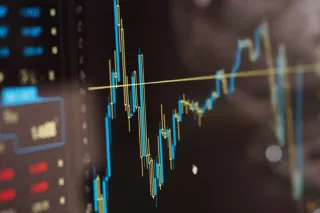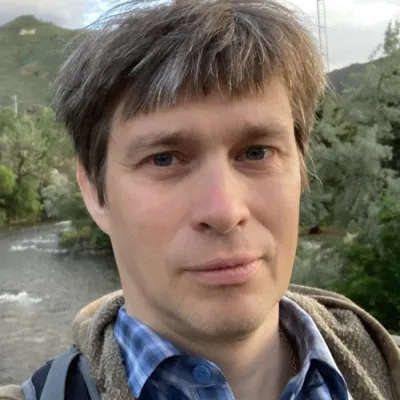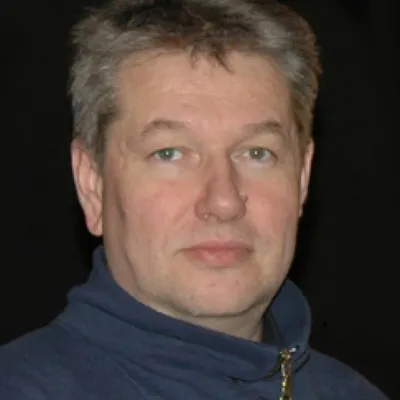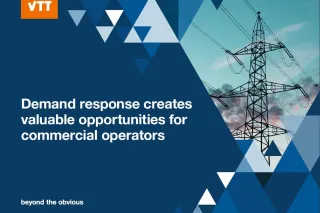Electricity price fluctuation creates a valuable opportunity for companies
By adopting an approach called demand response, companies can ensure sufficient electricity supply for everyone. Demand response also offers clear monetary benefits when the price of electricity is high.
On this page:
Download your copy now
What is demand response?
Demand response means momentary flexibility in energy use to balance energy costs and availability.
Operations such as charging electric vehicle batteries, air conditioning in office buildings, or electric heating systems are suitable for the demand response approach to name a few.

What do you need to know?
This white paper covers topics such as:
- In which operations can a company implement demand response?
- 4 concrete steps for implementation
- Brand new demand response opportunities in the future
Learn how your organisation can start implementing demand response now.
How VTT can help you?
At VTT, our expertise covers consumption and demand response potential forecasting, optimisation of demand response locations, demand response market and multimarket optimisation, and cost-effective investments in demand response locations.
With our expertise, we are here to help you design a demand response solution to your organisation.
Download our white paper and learn more about the possibilities of demand response!

Writers

Dr. Jussi Kiljander is a Senior Scientist at VTT. He received his M.Sc. (Technology) in 2010 and Ph.D. (Technology) in 2016 from University of Oulu, Finland.
He has a broad expertise in machine learning and its applications in energy and power systems. His current research focuses on demand-side flexibility management by combining machine learning with physics-based modelling and optimal control. He is leading the research on VTT EnergyTeller and Energy Management Agent (EMA) topics. He has been a project manager, technical coordinator and work package leader in several EU and customer projects. He has authored over 35 scientific publications.

Matti Aro is a Research Scientist in Smart Grids -team at VTT. He received the Master’s degree in Electrical Engineering from Tampere University of Technology in 2017, Power Systems and Markets as his major. Matti is currently pursuing the Ph.D. degree in Tampere University studying Aggregator models.
He has solid background in Demand Response both in industry and research. His research is focused on electricity market policy and regulation in Europe and in the US, sector integration, energy communities and power system management.

Kalle is a Senior Scientist at VTT. By carrying out research and development in several research institutions across Europe, Kalle has gained a versatile background in power distribution systems in practical and theoretical level. His research focus is on integration of electric vehicles in power systems, and development of energy communities. He works close to the industry but is also an active member in the academic community.

Juha Kiviluoma has 18 years of research experience and is currently Principal Scientist in Design and Operation of Energy Systems research node at VTT.
He has participated in the development of several energy system models and tools including WILMAR, Balmorel, Backbone, IRENA FlexTool, Spine Toolbox, SpineOpt and Predicer. He has co-authored approximately 150 publications including 42 peer reviewed articles (Scopus h-index 21, Google scholar h-index 31). Juha’s main research interest is in modelling energy systems with qualifications in problem formulation, model formulation, programming, generation planning, unit commitment and dispatch, power system reserves, market design, capacity adequacy, and energy resources.

Arttu Tamminen has 4 years of experience in VTT in energy related projects. Topics of interests are energy production, its usage, optimization of processes, energy efficiency and green solutions.
Education: Master of Science in Process Engineering, Major in Energy technology and minor in Automation, BSc from Energy Technology
Current projects are on topics of energy markets, demand response and optimization of energy with usage of district heating networks.

Kalevi Piira, MSc (Tech has more than 30 years experience in research projects lately in the following areas: Smart buildings, smart energy (and smart city KPI) based applications and data platforms (including software interfaces, protocols, standards and data acquisition algorithms) and especially those big data platforms on-line connected research prototypes (simulators, smart algorithms, AI/machine learning boosted digital twins, BIM and game engine based 3D visualization applications and city KPI tools) development, demonstration and piloting.
In addition, participation in international standardization of building automation, building energy efficiency, energy metering and especially building related smart grid integration protocols and standards.
